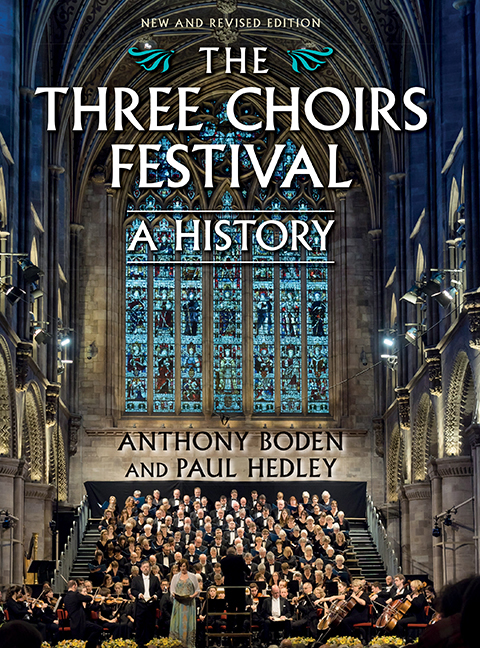Book contents
- Frontmatter
- Contents
- List of Illustrations
- Preface
- Acknowledgements
- List of Abbreviations
- List of Cathedral Organists
- 1 Origins
- 2 A Fortuitous and Friendly Proposal
- 3 A Numerous Appearance of Gentry
- 4 ‘The Musick of my Admiration Handel’
- 5 The Gentlemen and the Players
- 6 Avoiding Shipwreck
- 7 Prima voce
- 8 Favourites and Flops
- 9 Sacred and Profane
- 10 Froissart
- 11 The Unreasonable Man
- 12 The Dream
- 13 Beyond these Voices
- 14 An Essentially English Institution
- 15 The Elgar Festivals
- 16 Dona nobis pacem
- 17 Recovery
- 18 Association
- 19 A New Epoch
- 20 Jubilee
- 21 Theme with Variations
- 22 Houses of the Mind
- 23 ‘A Gold-Plated Orchestra’
- 24 A New Millennium
- 25 Reorganisation
- 26 An Invitation to the Palace
- Appendix Three Choirs Festival Timeline
- Select Bibliography
- Index
- Plate section
7 - Prima voce
Published online by Cambridge University Press: 11 August 2017
- Frontmatter
- Contents
- List of Illustrations
- Preface
- Acknowledgements
- List of Abbreviations
- List of Cathedral Organists
- 1 Origins
- 2 A Fortuitous and Friendly Proposal
- 3 A Numerous Appearance of Gentry
- 4 ‘The Musick of my Admiration Handel’
- 5 The Gentlemen and the Players
- 6 Avoiding Shipwreck
- 7 Prima voce
- 8 Favourites and Flops
- 9 Sacred and Profane
- 10 Froissart
- 11 The Unreasonable Man
- 12 The Dream
- 13 Beyond these Voices
- 14 An Essentially English Institution
- 15 The Elgar Festivals
- 16 Dona nobis pacem
- 17 Recovery
- 18 Association
- 19 A New Epoch
- 20 Jubilee
- 21 Theme with Variations
- 22 Houses of the Mind
- 23 ‘A Gold-Plated Orchestra’
- 24 A New Millennium
- 25 Reorganisation
- 26 An Invitation to the Palace
- Appendix Three Choirs Festival Timeline
- Select Bibliography
- Index
- Plate section
Summary
FOR the first three-quarters of the nineteenth century, Britain was the unchallenged supplier of the world's goods, skills and services. Although one-third of the people lived in a residuum of wretched poverty, the nation as a whole attracted unprecedented wealth, as a result of which the finest foreign singers were drawn to London opera houses and concert halls to perform alongside the best British artists.
At a time when the radio and the gramophone were less than dreams, a public hungry for music was prepared to pay high prices for opera and concert tickets, and national and international celebrity singers could demand huge fees for their appearances. At the end of the London season each year, these stars would tour the country, singing at regional music festivals such as Leeds, Liverpool, Norwich, Birmingham and Three Choirs.
To enable provincial concert-goers to see and to hear as many of their renowned favourites as possible, it was customary for the solo parts of a work performed at Three Choirs to be divided between a first and second singer of the same voice, the former receiving a higher fee than the latter. Not surprisingly, this division sometimes led to rivalry and to contractual problems.
In addition to singing in performances of sacred works in the cathedrals, the same stars would take part in the evening Miscellaneous Concerts in secular venues. To modern tastes these concerts would seem to have been overlong and indigestible mixtures of operatic arias, ballads, humorous songs and instrumental and orchestral pieces. However, they gave people living in rural communities the occasional opportunity to experience a cross-section of the entertainment enjoyed regularly by their compatriots in London. To them it seemed not the least bit incongruous that, as at Gloucester in 1847, Marietta Alboni should share the bill with, among others, John Parry – a comic singer and ‘shaker of sides’ – and that following Alboni's performances of operatic arias and duets with the great bass Joseph Staudigl, Parry was ‘received uproariously, was in uproarious humour, and was uproariously encored in both his ingenious pasticcios’.
- Type
- Chapter
- Information
- The Three Choirs Festival: A HistoryNew and Revised Edition, pp. 103 - 119Publisher: Boydell & BrewerPrint publication year: 2017



